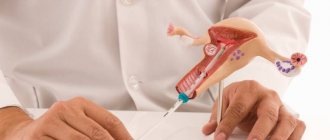On the eve of and during the monthly cycle, women of different ages experience pain - pulling in the lower abdomen, radiating to the lower back or pelvic area, headache. If the sensations are not expressed, this is normal. But when the pain is severe or begins long before your period, you should consult a doctor and undergo an examination.
Is it normal to have pain before your period?
Pain syndrome on the eve of the monthly cycle is called algodismenorrhea (also dysmenorrhea). Normally, all 4 phases should pass painlessly, but often extraneous symptoms appear only in the first stage. The disorder is due to the fact that the uterine lining is rejected. Moreover, pain appears literally on the first day of menstruation - namely, within a few hours. Typical symptoms are:
- pain in the lower abdomen (i.e. in the pelvic area);
- pain often radiates to the hip or lumbar region;
- headaches subsequently develop;
- various digestive disorders appear;
- Nausea and vomiting are often observed;
- mood swings, irritability, tearfulness;
- hardening of the mammary glands.
Similar sensations may appear already in the initial hours of the onset of the first phase. In some cases, they appear towards the middle or end of the cycle. Moreover, over time, pain and other disorders can only increase. Regardless of the clinical picture, in all the described cases the patient is diagnosed with algodysmenorrhea.
It also happens that pain begins a few days before the start of the cycle. This is due to increased concentrations of substances such as prostaglandins. They regulate the contractions of the uterus and the vessels that supply it with blood. If there are too many prostaglandins, this leads to poor blood flow and sudden contractions of the uterus (spasms). As a result, quite noticeable pain appears, and it can be very unpleasant.
Attention!
The period of onset of pain varies greatly. In some women it occurs in the first hours or the day before the cycle, in others several days (up to 14). The timing depends on the individual characteristics of the body and concomitant diseases.
Weight gain and contraception
Many women complain of weight gain while taking birth control pills. This is partly due to an increase in appetite and weight gain of several kilograms. But the main reason is still that hormonal pills also cause water retention.
Taking birth control pills
When treated with birth control pills, a woman does not experience hormonal surges and does not experience true menstruation. In fact, this is bleeding associated with hormone withdrawal. In a natural cycle, hormone levels are variable. The level of hormones in tablets gives a higher concentration of hormones in the blood than in the physiological cycle. Thus, the susceptibility to water retention and weight gain while using birth control pills is higher and permanent.
This is especially obvious when using older generations of tablets, in which the progestin used (progesterone) promotes fluid retention. The new generation of tablets are diuretic and therefore remove water from the body, but sometimes increase the risk of blood clots by dehydrating and thickening the blood. Therefore, each pill option has both positive and negative effects.
Main causes of pain
The causes of pain can be different - they manifest themselves depending on the characteristics of the woman’s body. The main factors include:
- Psychogenic – most often people with neurasthenic or labile-hysteroid characteristics suffer from pain. Such girls often experience mood swings and increased anxiety, which can lead to frustration and a decrease in the pain threshold. Therefore, even small manifestations are felt noticeably more acutely.
- Physiological factors are closely related to psychogenic factors: asthenic body types are more susceptible to pain syndrome.
- Organic: pathologies of the reproductive system (this can be diseases such as endometriosis or uterine hyperreflexia).
- Individual – low pain threshold (manifests both during menstruation and in other situations).
Weight gain before menstruation - what are the reasons?
Weight gain before your period occurs due to changes in hormone levels, especially high levels of progesterone and estrogen. These sex hormones affect not only the function of the reproductive system, but also almost the entire body, including water and mineral balance.
Female sex hormones stimulate the secretion of the hormones vasopressin and aldosterone. Vasopressin, called antidiuretic hormone, controls the amount of water in the kidneys and can block the flow of water out of the body, causing water to accumulate in the tissues. Aldosterone retains sodium ions and affects their interaction with water molecules.
As a result, the mechanism of water retention is due to the influence of both vasopressin - direct water resorption, and aldosterone - indirectly, through sodium absorption. Sodium has a strong ability to bind water, so consuming large amounts of salt leads to water retention, swelling and weight gain.
What to do if you have bloating?
What to do to overcome this unpleasant phenomenon? You can’t get rid of it completely, but you can reduce the size and period of bloating. To do this, you need to follow a healthy lifestyle and doctors' recommendations.
Playing sports
Constantly engage in available sports: water aerobics, swimming, dancing, exercise equipment, running. During menstruation, heavy exertion is not recommended; it is better to walk long distances. While walking, gases are removed from the intestines and gastrointestinal tract much faster. Lie down only if you feel unwell. Pump up your abs, do exercises to strengthen your back muscles.
Proper nutrition
Proper nutrition is one of the main ways to combat bloating. Before menstruation, it is advisable to reduce food portions and increase the number of meals. Limit or completely avoid junk food and products that cause flatulence.
- Eat less salt. During PMS, as during pregnancy, you crave salty foods. Sodium retains water in the body, increases the load on the heart and hematopoietic system, and increases swelling.
- Limit your sugar intake. All sweets in the body are processed into glucose, which retains sodium in the body.
- Drink water. It improves digestion, helps fight constipation, and removes toxins from the body.
- Avoid tea, coffee, alcohol and carbonated drinks. They contribute to bloating.
- Drink herbal teas from mint and decoctions of chamomile, lingonberries, and cranberries. They reduce pain and remove excess fluid from the body.
- Eat foods rich in fiber. They help fight constipation.
- Keep it in moderation. When consuming large amounts, gas formation and bloating begin. A lot of fiber is found in cabbage, bran, beans, beans, and mushrooms.
- Temporarily exclude dairy products from your diet, which increase the manifestations of flatulence many times over.
- Take a complex preparation containing B vitamins, potassium, magnesium. They are responsible for digestion, strengthening blood vessels and calming the nerves.
Warm baths
Before your period starts, take warm, soothing baths. You can add sea salt, a few drops of fennel or black pepper essential oil, and a decoction of valerian, pine needles, mint, and sage herbs to the water. Baths help you relax, promote healthy sleep, and strengthen the nervous system.
Sex
Sex is good for the body. To improve your well-being and mood, doctors recommend having sex before your period. It helps blood circulation in the pelvic area and has a beneficial effect on the female body.
Cloth
If your belly enlarges for natural reasons, you should not try to tighten it with a corset or shapewear. Strong compression causes severe pain due to impaired blood supply, increased swelling, intestinal spasms, and flatulence. It is better not to tighten your stomach, but to wear loose clothes.
Medicines
If the abdominal volume increases, take medications depending on the cause of the bloating:
- If the main symptom is tension, pain, spasms of the intestines and uterus, then antispasmodics help well: 1-2 tablets of No-shpa, Spasmalgon, Drotaverine.
- If your stomach is very swollen, use carminatives: Disflatil, Espumisan, Antareit.
- If you experience flatulence, bowel dysfunction, nausea, use enterosorbents: Smecta, Polyphepan, Activated carbon.
The medication should not be abused. It is better to consult a gynecologist.
Bloating occurs in 75% of women. This is a normal reaction of the body to hormonal changes during premenstrual syndrome and menstruation. If the symptoms of PMS do not go away, contact a specialist and conduct a comprehensive examination. After treatment of concomitant diseases, if preventive rules are followed, a slight increase in the waist will be noticeable only a couple of days at the beginning of menstruation.
Menstrual irregularities as a cause of loose stools
Menstruation is accompanied by complex biochemical processes that affect the functioning of the nervous system, internal organs and the condition of the body as a whole. Failure in these processes leads to painful menstruation (dysmenorrhea)1,2 and often causes diarrhea during menstruation.
According to some data, up to 80% of women experience dysmenorrhea to one degree or another at different periods of life1. Some of them may experience diarrhea during menstruation. In 30% of cases, painful symptoms lead to disability within 1-5 days1.
The development of painful manifestations of dysmenorrhea is facilitated by:
- heavy physical activity1;
- sedentary lifestyle2;
- complicated heredity (every third woman with dysmenorrhea suffered from the same menstrual cycle disorder)1;
- smoking, regardless of the number of cigarettes smoked2;
- adverse effects of the external environment (hypothermia, overheating)2;
- infections2;
- stressful situations1,2.
Up to contents
How many days before your period does your belly get bigger?
The abdomen begins to increase in size before menstruation in women individually: starting from 1.5-2 weeks to 2-3 days. It depends on the presence of factors:
- Body type. A person is thin, overweight or of normal build.
- Physical training. Pumped up abdominals or weak ones.
- Elasticity of the uterine muscles. Usually weakens after childbirth. Special gymnastics is required to bring the pelvic floor muscles back to normal.
In young athletic girls, the belly does not increase before and during menstruation, but in obese and women who have given birth, bloating is observed, and a weight gain of 2-3 kg is possible. This is a natural reaction of the body, do not be afraid. On the 2-3 day of bloody discharge, waist size and weight return to normal.
Diagnostics
IBS may be suspected if bowel problems occur for at least 12 weeks in the past 12 months3. Since diarrhea can be a manifestation of other diseases, if symptoms recur, you should consult a doctor and undergo an examination, including ultrasound of the abdominal organs, colonoscopy, sigmoidoscopy and irrigography.
To understand why diarrhea during menstruation is accompanied by disruption of the reproductive system, you need to consult a gynecologist. Identifying the causes will help you choose the right treatment and cope with the problem.
Urgent consultation with a doctor is required in the following cases:
- Severe abdominal pain, accompanied by tension in the anterior abdominal wall (possibility of acute surgical illness, for example, peritonitis).
- Frequent watery stools, which are accompanied by nausea, vomiting, thirst, dry visible mucous membranes, and fever (possible signs of an intestinal infection).
- The appearance of scarlet and dark blood in the stool (a symptom of intestinal bleeding).
Up to contents
What to do if you regularly have diarrhea during menstruation
Considering the large role of psycho-emotional factors in the development of dysmenorrhea and IBS, doctors recommend:
- Normalize your work and rest schedule, sleep at least 7-9 hours a day.
- Learn relaxation techniques and meditation.
- Avoid heavy physical activity before menstruation, stick to light exercises, yoga, and gymnastics.
- On the eve of menstruation, exclude from the diet foods that irritate the intestines and cause increased gas formation: products made from yeast dough and whole milk products, fresh vegetables and fruits, eggs and legumes, coffee and carbonated drinks, spicy, fatty, fried and spicy foods, canned food, smoked and marinades3,4.
- As one of the methods for treating recurring diarrhea during menstruation, doctors use physiotherapeutic procedures: climatotherapy, hydrotherapy, balneotherapy, light and electrotherapy, hyperbaric oxygenation, massage, acupuncture, acupressure and others5.
- To normalize stool during diarrhea, you can use the drug IMODIUM® Express based on loperamide6. Loperamide reduces intestinal motility, slows down the movement of intestinal contents, promotes the reabsorption of water and electrolytes from the intestine into the blood, and fecal retention7.
The information in this article is for reference only and does not replace professional advice from a doctor. To make a diagnosis and prescribe treatment, consult a qualified specialist.
Literature
- Prilepskaya V.N., Mezhevitinova E.A. Dysmenorrhea. Regular issues of "RMZh" No. 3 dated 02/04/1999, p. 6.
- Jobava E.M., Mandrykina Zh.A. Dysmenorrhea. Etiopathogenesis, differential diagnosis and therapy in the practice of a modern obstetrician-gynecologist. RMJ. “Mother and Child” No. 1 from 01/19/2012, p. 28.
- Zhikhareva N. S. Irritable bowel syndrome. Regular issues of "RMZh" No. 18 dated September 23, 2005, P. 1219.
- Petrov D.P. Irritable bowel syndrome. Consilium Medicum. 2009; No. 8, pp. 40-43.
- Kachalina O.V. Treatment of dysmenorrhea and premenstrual syndrome in an outpatient setting - modern possibilities. Difficult patient. 2015; 01-02: pp. 12-19.
- Instructions for use of the drug IMODIUM® Express
- Register of medicines in Russia. Active ingredients. Loperamide. https://www.rlsnet.ru/mnn_index_id_637.htm.
Find out more about IMODIUM® Express
Causes of bloating before menstruation
To combat unpleasant symptoms of PMS, you need to know the reasons for their occurrence. They are divided into a number of categories.
Hormonal reasons
The menstrual cycle of women is a complex process, accompanied by monthly hormonal changes in the body during the childbearing period. The changes are associated with the level of three hormones: prolactin, progesterone, estrogen. The level of estrogen increases at the time of ovulation, gradually decreasing, with progesterone the opposite: the maximum amount occurs at the beginning of bleeding. Premenstrual syndrome causes a decrease in estrogen levels while increasing progesterone.
- Endometrial growth. The female hormone responsible for preparing the body for conception and bearing a child is called progesterone. It stimulates the growth of the endometrium (the mucous membrane inside the uterus), which has a porous structure consisting of many blood vessels. The substances necessary for development are supplied to the embryo through the vessels. This is how the body prepares for conception. The uterus swells, affecting the intestines, and the size of the abdominal muscles increases. If pregnancy does not occur, the reverse process begins. The membrane peels off, leaves the body with blood during menstruation, compression of neighboring organs goes away, and the size of the uterus returns to normal.
- Swelling. These same hormones force the female body to accumulate excess water in the abdominal tissues, arms, legs, and face. During blood loss, this helps to avoid dehydration and, when processed, the fluid enters the blood.
- Ovulation. Often the belly begins to swell during ovulation. A strong hormonal surge occurs, to which the body reacts with pain, bloating, and flatulence.
Intestinal peristalsis
In the period after ovulation before spotting, blood flow to the uterus and ovaries increases. They begin to swell, squeezing the intestinal walls, causing spasms. Food moves unevenly, forming air barriers. The woman's stomach growls, swells, severe gas formation begins, and stool upset. After menstruation everything returns to normal.
Pregnancy
Perhaps pregnancy has occurred. In the first weeks it is difficult to determine. Due to the hormone progesterone, a change occurs in the body that prepares the female organs for bearing and giving birth to a child. The stomach inflates, the chest swells, and body weight increases. It is possible to independently determine pregnancy in the early stages by a hard lump in the lower abdomen. If conception does not take place, the belly remains loose and soft. A delay of a couple of weeks indicates the need to purchase a pregnancy test at the pharmacy. If the result is positive, you should contact a gynecologist.
Pathological processes
A slight swelling in the waist area does not interfere with everyday life, but if the stomach is very swollen before menstruation, constantly rumbles, and hurts, this indicates hidden human illnesses:
- Gastrointestinal diseases. Colitis and gastroduodenitis are often chronic, sometimes manifesting as acute attacks of pain. Blood and water, having accumulated in the abdominal cavity, put pressure on the internal organs, provoking an exacerbation of diseases. Gases swell the intestines, causing cramps, nausea, flatulence, and problems with bowel movements. Severe pain is likely in the lower abdominal cavity, in the navel area.
- Genitourinary system. With kidney disease, fluid is constantly retained in the body, and when menstruation occurs, the frequency of urination decreases significantly. An enlarged abdomen is accompanied by: swelling of the legs, arms, and face. Bags appear under the eyes, constant dull pain in the lower back. There is drowsiness, lethargy, and rapid heartbeat. Blood pressure rises.
- Gynecological diseases. The symptom “acute abdomen” is considered a sign of female diseases, which are characterized by severe pain and spasms radiating to the anus and lower back:
- inflammation of the ovaries, uterus;
- adhesions in the pelvic organs;
- chronic oophoritis;
- ovarian cyst;
- neoplasm: uterine fibroids. This benign tumor can develop into malignant. The presence of fibroids is characterized by a rounded tummy, as during pregnancy, then severe pain appears, and menstruation may stop. If you have fibroids, you should be under constant supervision of a gynecologist and undergo an examination once a year.
Binge eating
Thanks to the hormone progesterone, which acts on the nervous system, almost all women begin to feel hungry a week before their period. They eat a lot, become nervous and irritable.
To cheer up, you want to experience joy, have fun. The easiest way to get rid of depression is to eat delicious food. And everything tasty, as a rule, high-calorie or salty, leads to fluid retention and the appearance of a round belly.
PMS and the associated hormonal imbalance negatively affect a woman's will. If usually many limit themselves in food and refuse sweets, then here women give in.
Large volumes of food at this time are poorly digested, food masses stagnate in the intestines. The result is flatulence and bloating.











